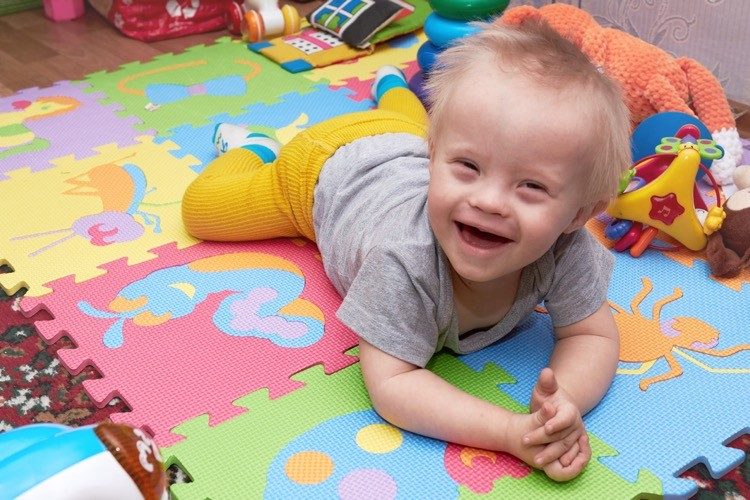
“Life unworthy of life.” That’s what the Nazis called the handicapped, who were the first targeted in their eugenics program. Eugenics, the science of improving the human race via selective breeding, was discredited after WWII. But now it’s making a comeback, courtesy of the Left — and the handicapped are again in the crosshairs.
Writer Evita Duffy warned of this in her recent article, “It Is Not ‘Humane’ For The Atlantic To Sympathize With Killing Babies With Down Syndrome, Like My Little Sister.”
Appearing Friday on Tucker Carlson Tonight to discuss the topic, Duffy said that when “I first read the [Atlantic] article, I immediately thought about how dangerous it is.” Its author “essentially tries to normalize eugenics and [the killing of] some of the least powerful people in the world, people with Down Syndrome. And she does it by creating this ‘no judgment’ narrative,” Duffy continued.
“It was a perfect example of selective leftist outrage,” she also explained. “The liberals, they have no problem taking a moral stance when it’s the Covington Catholic schoolboy. But when you were faced with the real-world dilemma, the extermination of people with Down Syndrome, they say, ‘No judgment.’”
Of course, the non-judgmentalism nonsense is a non-starter. We all make moral judgments regularly; this is integral to human life. Moreover, leftists not only make them, they do so frequently, harshly, and without mercy; just consider the invective (“Nazis!” “fascists!” etc.) hurled at President Trump and his supporters.
This is most ironic with respect to the handicapped, too, as the Left sternly polices the language used to describe them. The message is: You can kill them — just don’t call them “retarded” or you’re cancelled.
Philosopher C.S. Lewis once said about such people that their “scepticism about values is on the surface: it is for use on other people’s values; about the values current in their own set they are not nearly sceptical enough.”
The bottom line, however, is that the non-judgmentalism argument is sophistic self-delusion. If we decided to allow people to kill a certain group in society, it would surely be recognized as a judgment (and likely a malicious one). Yet such a judgment is precisely what has been made here; the only difference is the victims’ location: the womb.
The Atlantic article, titled “The Last Children of Down Syndrome,” “explores the effects of prenatal testing in Denmark,” relates Duffy, where “more than 95 percent of those who receive a DS diagnosis choose to abort their child.”
The piece showcases parents who received such a diagnosis. Among them is a woman who “complained that her child with DS is frustrated with his communication limitations and resorts to biting and fighting with his siblings,” writes Duffy. “The mother, who says she ‘loves her son,’ nonetheless admits, ‘We would have asked for an abortion if we knew.’”
Okay, well, then why not kill him now? This is a serious question: Saying you would have killed him prenatally if you’d known means you believe it would be better or preferable, somehow, if he were dead. So why not provide him a painless exit from this fold — as George finally did with the intellectually handicapped Lenny in Steinbeck’s Of Mice and Men — and create that “better situation”?
Obviously, such a late, late, late post-partum “abortion” would be illegal, and people certainly view it differently. But why? How much of this is simply that it’s easier to kill when it’s “Out of sight, out of mind”; when you haven’t looked into the victim’s face; when, in fact, that face is too small to see or is at least hidden from you?
Now maybe we know why philosopher G.K. Chesterton wrote, making the point rhetorically, “Let all the babies be born. Then let us drown those we do not like.”
We do tend to like them, of course, and this brings us back to Duffy’s DS sister, Valentina. “She’s so sweet, so adorable, she loves music, she’s the favorite of the family — I think even the favorite of my parents, though they won’t admit it,” she also said on Carlson’s show (video below). “It made me think really, what’s at stake here?”
Hearing Duffy’s affection for her sister brings to mind a handicapped individual I’d sometimes meet at a church. He was about 54 at the time, used a walker, and had a kind of intellectual impairment I can’t identify. Yet he was always joyful and a joy to be around and I’m quite sure the holiest man at the church. But what really struck me was what his sister, who took care of him, said while referencing herself and her other siblings:
“We learned to love through him.”
In other words, having to take care of him and learn patience and kindness — and, maybe, witnessing his loving example — made them better people.
So while Duffy lamented with Carlson that there’s “an incentive to not have people with disabilities because more people with disabilities causes strain on the state,” the moral of this story is that people’s value can’t be measured in dollars and cents. Some individuals help you gain the world — others help you purify your soul.
This will mean little to those who consider the soul a myth, and this is why it’s no surprise that the left-wing Atlantic is rubber-stamping eugenics. In fact, it was the Left that pushed such science prior to WWII to begin with, as I illustrate in my 2010 essay, “Engineering Oblivion: Eugenics, the Remaking of Man and Unmaking of Morality.”
And this really is a matter of Souls and Men. Duffy correctly points out in her article that Danish “culture is even more secular [than ours] and there are far fewer moral stigmas around the decision to abort.” This is no coincidence.
If man truly is a sacred being, created by a God who has forbade the taking of innocent human life, then the judgment is simple. If, however, we’re mere organic robots — some pounds of chemicals and water — the judgment is also simple: anything goes. For what’s wrong with terminating a robot’s function?
This is why asking those fundamental questions, and finding the right answers, really does matter.



